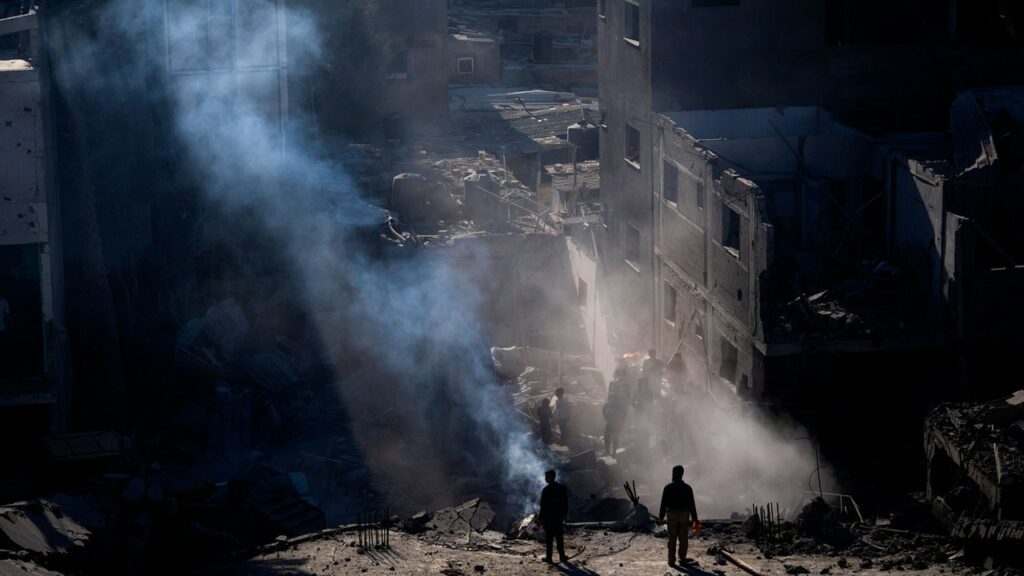When I spoke to right-wing Orthodox Jewish settlers working in Gaza to grow tomatoes in hothouses and swimming in the sea fully clothed, they swore to me that this land was theirs. When I spoke to Arabs who showed deeds to plots of land in the West Bank, now occupied by Israeli settlers, they swore to me that this land was theirs. Who was right? I saw Russian and Ethiopian immigrants who were not born Jewish but who had converted, who, having emigrated to Israel, now had more rights than the Palestinians who still held the keys to the houses from which their ancestors had been evicted in 1947. I saw the Shabab protesting, risking bullets and tear gas, slinging stones like a legion of Davids versus a mighty Goliath. Later, I interviewed the families of Palestinian suicide bombers and the families of their victims. Once, I spent time shuttling between the families of two 17-year-old girls, one Jewish, one Palestinian, who lived several miles away from each other, not far from Bethlehem. Their mothers were united in pain.
A Palestinian child throws a stone at an Israeli tank on a road at the Palestinian Daheisheh refugee camp on the outskirts of West Bank town of Bethlehem 02 July 2002.
By Musa Al-Shaer/AFP/Getty Images.
My life’s work, in a sense, was honed by those years researching my book on the First Intifada and the Second Intifada, which came a decade later. But what I was struck by was a deep sense of injustice and a violation of laws, which Langer and her colleagues worked on tirelessly. At the time of the First Gulf War, in 1990–91, I flew to Vienna to see Langer accept a major human rights award. But by then she was exhausted from her years filing motions and lawsuits in Israeli military courts, being mocked by judges. She had lost most cases she tried, but she had kept going. Shortly after that, she emigrated to Germany to teach law at Heidelberg University and live a life away from the occupation, which haunted her.
October 7 was a horrendous act of savagery. The sadistic glee with which the perpetrators carried out their carnage—captured on their own cell phones and Go-Pro cameras—was evil personified. But the plot and the execution of the October 7 plan by Hamas—as inexcusable as it was—did not, as the UN Secretary-General Antonio Guterres famously said, “happen in a vacuum.” Preceding it was not just the 1947 Nakba when Palestinians were expelled from their lands in the wake of the nascent Israeli state, but the First and Second Intifadas. The summer before 10/7, extremist West Bank settlers, seemingly in line with Netanyahu’s radical expansion policies, ran amok in the West Bank, burning Palestinian land, and terrorizing and killing civilians. What would it be like to be born in a land where you knew your people had no rights and were granted no dignity, and where you could not defend yourself? Somewhere where you did not have powerful friends like the United States or Germany or the United Kingdom? Generation after generation of Palestinian kids grew up scarred, bitter, angry, and broken.
Visitors walk around portraits of people who were taken hostage or killed in the Hamas attack on the Supernova music festival on October 7, at the site of the festival near Kibbutz Reim in southern Israel on May 13, 2024.By Jack Guez/AFP/Getty Images.
In 2021–22, Vanity Fair gave me an unusual assignment to go to Gaza and not focus on the misery and deprivation, but to talk to millennials and members of Generation Z who were succeeding and thriving despite a blockade on both sides of the Gaza Strip by both Israel and Egypt. This is not to say their conditions were not miserable—they were. Daily electricity cuts; inability to leave Gaza for studies or workshops; even getting an Apple computer sent in was impossible. But I still met extraordinary—and extraordinarily resourceful—young people I believed were the key to Gaza’s future: a future beyond Hamas. I was awed by their talent, tenacity, and drive, despite the limits being placed on them at every turn.
The terrible events of October 7 traumatized Israeli society. They also destroyed any thread of hope that people like my young friends had for peace, or for living a life beyond the conflict. These were the people I was counting on for peace. Many are now dead. The Gaza Sky Geek was a computer coding academy whose cheerful headquarters, bearing signs from places the coders would never get to go—New York, Berlin, London—was a venue where I loved to hang out. But many of those young coders are dead or displaced. The music store and studio where I went to listen to my favorite rock band, Osprey V, is gone. These young people held the promise of the Palestine of tomorrow, one in which Israelis and Palestinians might coexist peacefully. But since the wanton destruction of Gaza—and the continuing hail of missiles and rockets that have been exchanged between Hamas, Iran, Hezbollah, the Houthis, and Israel—that is simply not possible. It will not happen in the foreseeable future.
Source link : http://www.bing.com/news/apiclick.aspx?ref=FexRss&aid=&tid=6703d3f53d1841cf8c6264ffbb58043a&url=https%3A%2F%2Fwww.vanityfair.com%2Fnews%2Fstory%2Fthe-sorrow-of-gaza-one-year-after-the-october-7-attacks&c=14634588450111763275&mkt=en-us
Author :
Publish date : 2024-10-06 23:00:00
Copyright for syndicated content belongs to the linked Source.
